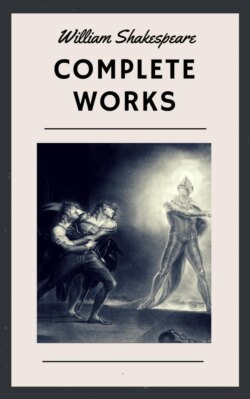Читать книгу William Shakespeare: Complete Works - William Shakespeare - Страница 126
На сайте Литреса книга снята с продажи.
SCENE III. Another part of the field
ОглавлениеEnter POSTHUMUS and a Britain LORD
LORD. Cam'st thou from where they made the stand?
POSTHUMUS. I did:
Though you, it seems, come from the fliers.
LORD. I did.
POSTHUMUS. No blame be to you, sir, for all was lost,
But that the heavens fought. The King himself
Of his wings destitute, the army broken,
And but the backs of Britons seen, an flying,
Through a strait lane- the enemy, full-hearted,
Lolling the tongue with slaught'ring, having work
More plentiful than tools to do't, struck down
Some mortally, some slightly touch'd, some falling
Merely through fear, that the strait pass was damm'd
With dead men hurt behind, and cowards living
To die with length'ned shame.
LORD. Where was this lane?
POSTHUMUS. Close by the battle, ditch'd, and wall'd with turf,
Which gave advantage to an ancient soldier-
An honest one, I warrant, who deserv'd
So long a breeding as his white beard came to,
In doing this for's country. Athwart the lane
He, with two striplings- lads more like to run
The country base than to commit such slaughter;
With faces fit for masks, or rather fairer
Than those for preservation cas'd or shame-
Made good the passage, cried to those that fled
'Our Britain's harts die flying, not our men.
To darkness fleet souls that fly backwards! Stand;
Or we are Romans and will give you that,
Like beasts, which you shun beastly, and may save
But to look back in frown. Stand, stand!' These three,
Three thousand confident, in act as many-
For three performers are the file when all
The rest do nothing- with this word 'Stand, stand!'
Accommodated by the place, more charming
With their own nobleness, which could have turn'd
A distaff to a lance, gilded pale looks,
Part shame, part spirit renew'd; that some turn'd coward
But by example- O, a sin in war
Damn'd in the first beginners!- gan to look
The way that they did and to grin like lions
Upon the pikes o' th' hunters. Then began
A stop i' th' chaser, a retire; anon
A rout, confusion thick. Forthwith they fly,
Chickens, the way which they stoop'd eagles; slaves,
The strides they victors made; and now our cowards,
Like fragments in hard voyages, became
The life o' th' need. Having found the back-door open
Of the unguarded hearts, heavens, how they wound!
Some slain before, some dying, some their friends
O'erborne i' th' former wave. Ten chas'd by one
Are now each one the slaughterman of twenty.
Those that would die or ere resist are grown
The mortal bugs o' th' field.
LORD. This was strange chance:
A narrow lane, an old man, and two boys.
POSTHUMUS. Nay, do not wonder at it; you are made
Rather to wonder at the things you hear
Than to work any. Will you rhyme upon't,
And vent it for a mock'ry? Here is one:
'Two boys, an old man (twice a boy), a lane,
Preserv'd the Britons, was the Romans' bane.'
LORD. Nay, be not angry, sir.
POSTHUMUS. 'Lack, to what end?
Who dares not stand his foe I'll be his friend;
For if he'll do as he is made to do,
I know he'll quickly fly my friendship too.
You have put me into rhyme.
LORD. Farewell; you're angry. Exit
POSTHUMUS. Still going? This is a lord! O noble misery,
To be i' th' field and ask 'What news?' of me!
To-day how many would have given their honours
To have sav'd their carcasses! took heel to do't,
And yet died too! I, in mine own woe charm'd,
Could not find death where I did hear him groan,
Nor feel him where he struck. Being an ugly monster,
'Tis strange he hides him in fresh cups, soft beds,
Sweet words; or hath moe ministers than we
That draw his knives i' th' war. Well, I will find him;
For being now a favourer to the Briton,
No more a Briton, I have resum'd again
The part I came in. Fight I will no more,
But yield me to the veriest hind that shall
Once touch my shoulder. Great the slaughter is
Here made by th' Roman; great the answer be
Britons must take. For me, my ransom's death;
On either side I come to spend my breath,
Which neither here I'll keep nor bear again,
But end it by some means for Imogen.
Enter two BRITISH CAPTAINS and soldiers
FIRST CAPTAIN. Great Jupiter be prais'd! Lucius is taken.
'Tis thought the old man and his sons were angels.
SECOND CAPTAIN. There was a fourth man, in a silly habit,
That gave th' affront with them.
FIRST CAPTAIN. So 'tis reported;
But none of 'em can be found. Stand! who's there?
POSTHUMUS. A Roman,
Who had not now been drooping here if seconds
Had answer'd him.
SECOND CAPTAIN. Lay hands on him; a dog!
A leg of Rome shall not return to tell
What crows have peck'd them here. He brags his service,
As if he were of note. Bring him to th' King.
Enter CYMBELINE, BELARIUS, GUIDERIUS, ARVIRAGUS, PISANIO, and Roman
captives. The CAPTAINS present POSTHUMUS to CYMBELINE, who delivers
him over to a gaoler. Exeunt omnes
